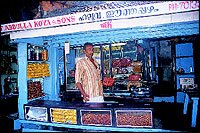 In the field of Malayalam Language and literature as also in localcuisine, Kozhikode has made most significant contributions. The district is famous for folk songs or ballads known as Vadakkan Pattukal. The most popular songs among them are those which celebrate the exploits of Thacholi Othenan. One of the favourite past times of the Muslims of the district is the singing of the Mappilapattu and Oppana. The songs are composed in a composite language of Arabic and Malayalam. The intellectual debate for vedic scholars to win the position of Pattathanam takes place at Thali temple during the month of Thulam. Kozhikode also has strong associations with ghazals and football. The football game has a huge fan following here, and the Football World Cup is followed with even greater enthusiasm than the unofficial national sport of India — the Cricket. Local clubs even pick favourites among competing nations, and vociferously support their teams.As for its local cuisine, Kozhikode has a variety of mouth watering dishes to offer as well. In the field of Malayalam Language and literature as also in localcuisine, Kozhikode has made most significant contributions. The district is famous for folk songs or ballads known as Vadakkan Pattukal. The most popular songs among them are those which celebrate the exploits of Thacholi Othenan. One of the favourite past times of the Muslims of the district is the singing of the Mappilapattu and Oppana. The songs are composed in a composite language of Arabic and Malayalam. The intellectual debate for vedic scholars to win the position of Pattathanam takes place at Thali temple during the month of Thulam. Kozhikode also has strong associations with ghazals and football. The football game has a huge fan following here, and the Football World Cup is followed with even greater enthusiasm than the unofficial national sport of India — the Cricket. Local clubs even pick favourites among competing nations, and vociferously support their teams.As for its local cuisine, Kozhikode has a variety of mouth watering dishes to offer as well.Sweetmeat lane The city also has a strong mercantile streak to it, with the major vein of commerce being the Mithai Theruvu, a long street crammed with shops that sell everything from sarees to cosmetics, and house hotels to sweetmeat shops. The name Mithai Theruvu or SM Street comes from the sweet Kozhikode Halwa which was often called as the Sweetmeat by European traders. The multi cultural mix of Kozhikode ensures that Onam, Christmas, and Id-ul-Fitr (the festivals of the Hindus, Christians, and Muslims) are celebrated with equal pomp, indulging in the local cuisine. Kozhikode is famous for its thick, black, translucent Calicut Halwa. Every sweet shop, every bakery, every major store selling food items and packaged foods, sells the ubiquitous Calicut Halwa. The black Calicut Halwa is made very simply out of maida and sugar, palm jaggery, and is cooked in coconut oil.The other coloured halwas do not taste much different, even though the orange, white and yellow varieties are jazzed up with chopped nuts, elaichi, and jeera. Flavours are not added, only colours. There is a banana halwa, too, which is made in vanaspati and not oil. The halwa is an integral part of Kerala cuisine. Kozhikode cuisine also offers fare for every palate. Vegetarian fare includes the sadya (the full-fledged feast with rice, sambhar, pappadum, pickles and seven different side dishes.) However, the non-vegetarian food offered in the city is a unique mix of Muslim and Christian preparations. Some popular dishes include the Kozhikode Biriyani or the Malabar Biriyani, Ghee Rice with meat curry, a whole host of sea-food preparations (prawns, mussels, mackerel, sea-fish) and paper thin Pathiris to provide accompaniment to spicy gravy. Other well known Kozhikode specialities are crisp and wafer thin Banana Chips made from coconut oil, and the Kozhikode Halwa | ||
Saturday, February 6, 2010
Kozhikode
Subscribe to:
Post Comments (Atom)

No comments:
Post a Comment